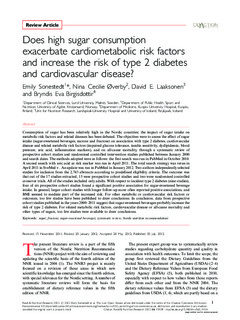| dc.contributor.author | Sonestedt, Emily | |
| dc.contributor.author | Øverby, Nina Cecilie | |
| dc.contributor.author | Laaksonen, David E. | |
| dc.contributor.author | Birgisdottir, Bryndis Eva | |
| dc.date.accessioned | 2013-01-28T11:20:05Z | |
| dc.date.available | 2013-01-28T11:20:05Z | |
| dc.date.issued | 2012 | |
| dc.identifier.citation | Sonestedt, E., Øverby, N. C., Laaksonen, D. E., & Birgisdottir, B. E. (2012). Does high sugar consumption exacerbate cardiometabolic risk factors and increase the risk of type 2 diabetes and cardiovascular disease? Food & Nutrition Research, 56: 19104. | no_NO |
| dc.identifier.issn | 1654-661X | |
| dc.identifier.uri | http://hdl.handle.net/11250/139029 | |
| dc.description.abstract | Consumption of sugar has been relatively high in the Nordic countries; the impact of sugar intake on metabolic risk factors and related diseases has been debated. The objectives were to assess the effect of sugar intake (sugar-sweetened beverages, sucrose and fructose) on association with type 2 diabetes, cardiovascular disease and related metabolic risk factors (impaired glucose tolerance, insulin sensitivity, dyslipidemia, blood pressure, uric acid, inflammation markers), and on all-cause mortality, through a systematic review of prospective cohort studies and randomised controlled intervention studies published between January 2000 and search dates. The methods adopted were as follows: the first search was run in PubMed in October 2010. A second search with uric acid as risk marker was run in April 2011. The total search strategy was rerun in April 2011 in SveMed. An update was run in PubMed in January 2012. Two authors independently selected studies for inclusion from the 2,743 abstracts according to predefined eligibility criteria. The outcome was that out of the 17 studies extracted, 15 were prospective cohort studies and two were randomised controlled crossover trials. All of the studies included only adults. With respect to incident type 2 diabetes (nine studies), four of six prospective cohort studies found a significant positive association for sugar-sweetened beverage intake. In general, larger cohort studies with longer follow-up more often reported positive associations, and BMI seemed to mediate part of the increased risk. For other metabolic or cardiovascular risk factors or outcomes, too few studies have been published to draw conclusions. In conclusion, data from prospective cohort studies published in the years 2000-2011 suggest that sugar-sweetened beverages probably increase the risk of type 2 diabetes. For related metabolic risk factors, cardiovascular disease or all-cause mortality and other types of sugars, too few studies were available to draw conclusions. | no_NO |
| dc.language.iso | eng | no_NO |
| dc.publisher | Taylor & Francis | no_NO |
| dc.rights | Navngivelse-Ikkekommersiell 4.0 Internasjonal | |
| dc.rights.uri | http://creativecommons.org/licenses/by-nc/4.0/deed.no | |
| dc.subject | sugar | no_NO |
| dc.subject | fructose | no_NO |
| dc.subject | sugar-sweetened beverages | no_NO |
| dc.subject | systematic review | no_NO |
| dc.subject | Nordic nutrition recommendations | no_NO |
| dc.title | Does high sugar consumption exacerbate cardiometabolic risk factors and increase the risk of type 2 diabetes and cardiovascular disease? | no_NO |
| dc.type | Journal article | no_NO |
| dc.type | Peer reviewed | no_NO |
| dc.rights.holder | © 2012 The Author(s) | |
| dc.subject.nsi | VDP::Medical disciplines: 700::Health sciences: 800::Nutrition: 811 | no_NO |
| dc.source.pagenumber | 19 | no_NO |
| dc.source.volume | 56 | no_NO |
| dc.source.journal | Food & Nutrition Research | no_NO |
| dc.identifier.doi | http://dx.doi.org/10.3402/fnr.v56i0.19104 | |
| dc.source.articlenumber | 19104 | |

